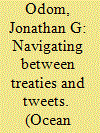|
|
|
Sort Order |
|
|
|
Items / Page
|
|
|
|
|
|
|
| Srl | Item |
| 1 |
ID:
158401


|
|
|
|
|
| Summary/Abstract |
In contemporary international discourse about maritime freedom (e.g., “freedom of navigation”), nations often speak in generalities, but rarely clarify what they mean. To reduce the risk of misunderstanding, nations should navigate their use of language between two purposes simultaneously. First, any discussion should be concise, communicable, and comprehendible. Additionally, nations should also be prepared to dialogue on these matters in greater depth and detail, and any substantive discussion should be faithful to the applicable international law that binds nations. A way to ensure such discourse is meaningful is by following a three-step process of labeling, framing, and applying. This article details this approach.
|
|
|
|
|
|
|
|
|
|
|
|
|
|
|
|
| 2 |
ID:
151428


|
|
|
|
|
| Summary/Abstract |
The concept of the command of the sea has its roots in medieval notions of the sovereignty of coastal waters, as claimed by several monarchs and polities of Europe. In the sixteenth century, a surge of intellectual creativity, especially in Elizabethan England, fused this notion with the Thucydidean term ‘thalassocracy’ – the rule of the sea. In the light of the explorations of the oceans, this led to a new conceptualisation of naval warfare, developed in theory and then put into practice. This falsifies the mistaken but widespread assumption that there was no significant writing on naval strategy before the nineteenth century.
|
|
|
|
|
|
|
|
|
|
|
|
|
|
|
|
| 3 |
ID:
083506


|
|
|
|
|
| Publication |
Westport, Praeger Security International, 2008.
|
| Description |
xiv, 262p.
|
| Standard Number |
9780275996451
|
|
|
|
|
|
|
|
|
|
|
|
Copies: C:1/I:0,R:0,Q:0
Circulation
| Accession# | Call# | Current Location | Status | Policy | Location |
| 053921 | 333.79095/COL 053921 | Main | On Shelf | General | |
|
|
|
|
| 4 |
ID:
118572


|
|
|
|
|
| Publication |
Berlin, Springer, 2007.
|
| Description |
xi,286p.hbk
|
| Standard Number |
9783540743323
|
|
|
|
|
|
|
|
|
|
|
|
Copies: C:1/I:0,R:0,Q:0
Circulation
| Accession# | Call# | Current Location | Status | Policy | Location |
| 057136 | 341.7566/PHI 057136 | Main | On Shelf | General | |
|
|
|
|
| 5 |
ID:
145652


|
|
|
|
|
| Summary/Abstract |
The principle of freedom of the seas remains the governing paradigm of the high seas in modern law of the sea. Although the principle, as embraced by the UN Convention on the Law of the Sea (LOSC), is no longer an absolute norm, it continues to present fundamental challenges for achieving effective conservation on the high seas as it stands in direct contrast to the conservation duty imposed on states by LOSC. The recent UN General Assembly resolution calling for the adoption of a further Implementing Agreement under LOSC to address conservation on the high seas, highlights the need to build a new ethos for management of the high seas, which will require states to loosen their firm grip on the Grotian doctrine. This article seeks to contribute toward shifting attitudes in relation to the principle of freedom through an examination of the nature and scope of the principle in its historic context and in contemporary law of the sea.
|
|
|
|
|
|
|
|
|
|
|
|
|
|
|
|
| 6 |
ID:
150075


|
|
|
|
|
| Summary/Abstract |
This analysis shows the importance of a problem of maritime law in an on-going debate between two interpretations of Wilsonian neutrality that have competed in various guises since the end of the First World War: can British blockade actions in that war be justified by American Civil War precedents? It proves that reliance on the “Civil War precedents” to justify Britain’s blockade measures was disingenuous from the beginning. British diplomats first used it in October 1914, and Woodrow Wilson embraced it to defend his mild response to British violations of neutral rights to incensed American citizens despite continuous protests from the State Department. Whilst all politicians involved knew the comparison was wrong, historians have embraced it as a justification of Britain’s illegal blockade ever since Arthur S. Link claimed it as the key to understanding Wilson’s neutrality policy.
|
|
|
|
|
|
|
|
|
|
|
|
|
|
|
|
|
|
|
|
|